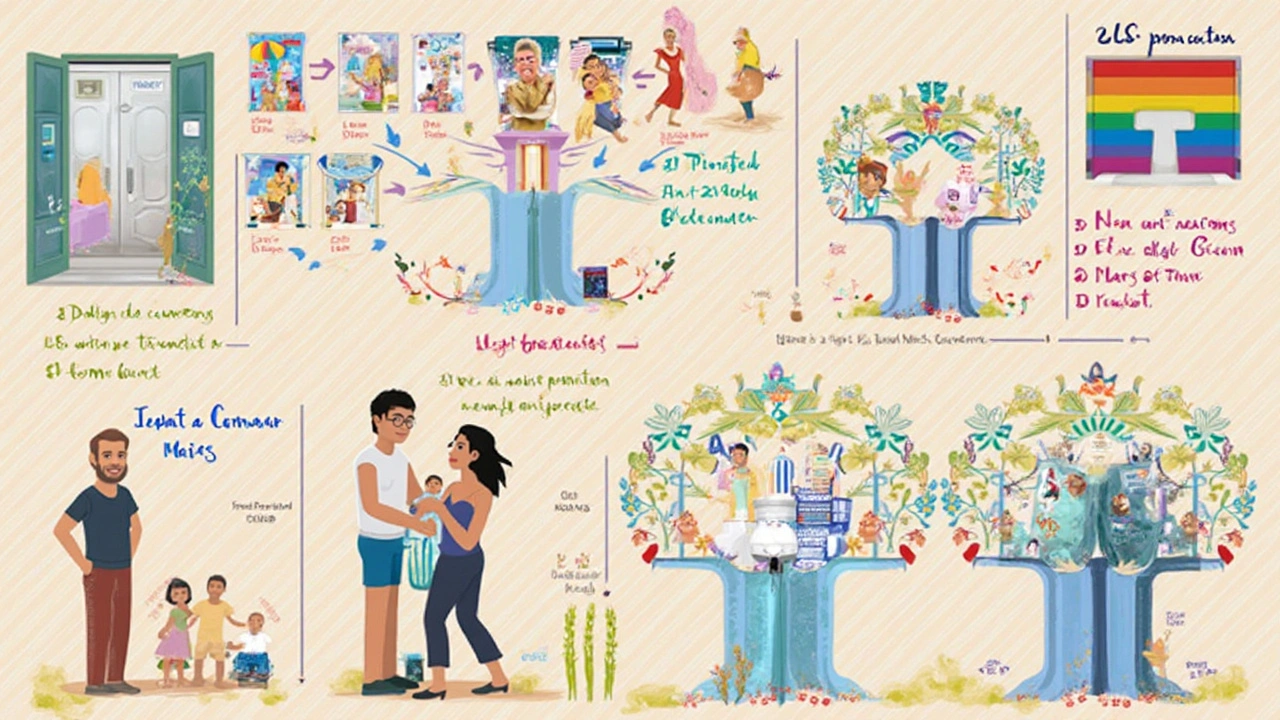LGBT Family Planning Guide: Key Steps to Choosing Donors, Surrogates, and Legal Support

Choosing Your Donor: From DNA to Dollars
Building a family as an LGBT couple or individual isn’t like grabbing takeout—there’s a whole system with its own rules, costs, and learning curves. First stop? Picking a donor. And honestly, there’s way more to it than what color eyes you like. I’ll tell you now: the sperm and egg donor world is part science, part legal thriller, and part shopping trip. Most people in Canada and the U.S. pick between “known” and “anonymous” donors. With a known donor, maybe it’s your college buddy or a cousin willing to help out. The stress here? You need rock-solid communication and clear legal agreements, or things can crash and burn when everyone isn’t on the same page about parenting roles and future contact. On the flip side, going through a sperm or egg bank means getting a file as thick as a phone book—medical histories, photos, education, you name it.
Here’s a little-known nugget: Canada’s Assisted Human Reproduction Act bans paying donors for their sperm or eggs, though you can reimburse them for stuff like travel and lost wages. That keeps costs predictable but means the donor pool is smaller than you might expect. The U.S. has fewer restrictions but is pricier, often ranging anywhere from $1,000 to $15,000 just for donor compensation. Banks also offer “open-identity” or “anonymous” options. Open-identity means your kid can connect with their donor once they hit legal adulthood, usually 18. Sound simple? Think again—some donors change their tune about anonymity over the years, so make sure you and your partner agree on what you want before you start shopping.
If you’re considering future siblings, check if your donor’s sperm or eggs are available in enough quantity. Some get snapped up quickly or have family limits. Statistically, people who choose donors through reputable banks get more extensive genetic and medical screening, reducing the risk of certain hereditary conditions. It pays to read real testimonials—plenty of parents share their lessons learned online. To dig even deeper into real process timelines and what to expect emotionally, check out this LGBT family planning guide. It gives a play-by-play that you won’t find just by browsing clinic websites.
Here’s a quick checklist to keep you on track:
- Confirm donor bank’s compliance with local and national regulations.
- Get a list of medical conditions screened for—double check it matches your family needs.
- Ask how donor anonymity is handled years down the road.
- For known donors, hire a family lawyer to draft agreements. Skipping this can get ugly.
At every turn, you’ll be running into forms, fine print, and a few weird hiccups (yes, there are sperm and egg donor Facebook groups out there—go figure). Keep records. Save emails. Family stories start in the details.

Surrogacy: Contracts, Costs, and Straight Talk
Surrogacy might look glamorous on Instagram, but beneath the surface it’s stacked with paperwork, costs, and things people don’t tell you in those feel-good blog posts. First, there are two major types: traditional and gestational surrogacy. Traditional surrogates use their own eggs. That means your surrogate is genetically related to the child. Because of legal gray areas and higher risk of disputes, gestational surrogacy is by far the preferred route—your surrogate carries an embryo created by sperm and/or egg from you, your partner, or a donor. That’s the situation for almost all professional surrogacy agencies.
Let’s break down the basics with some recent data. In Canada, you can’t pay a surrogate, but you reimburse for things like maternity clothes, medications, travel, and lost wages. A typical Canadian journey, after clinic fees, lawyer fees, and expenses, will run $60,000 to $90,000 or more. The U.S.? Average total costs hit $100,000 to $200,000, depending on agency fees, insurance, and possible emergencies. Always request a “fees forecast” from surrogacy agencies and ask for it in writing.
Contracts aren’t optional—they’re your lifeline. A good contract covers every possible ‘what if.’ What if the surrogate needs bed rest? What if there’s a dispute over selective reduction or pregnancy termination? Who pays for medical emergencies? Get all that in writing, with detailed clauses. I’ve seen situations where improper contracts led to heartache for everyone. Be upfront about expectations—will the surrogate attend your baby’s birthday years later, or is this strictly business? Spell it out.
Here’s where state and provincial laws matter more than you’d think. In Alberta, for example, both partners can often be listed on the birth certificate, but some other provinces aren’t as progressive. South of the border, Illinois or California are surrogacy-friendly, but try Texas or Michigan and you could face big headaches—sometimes even criminal penalties for commercial surrogacy agreements. That’s wild, but true. Check every single law in the state or province where the baby will be born. And never assume what worked for one couple next door will work for you. Each clinic and agency may have their own policies too.
Here’s a sample table to help keep the various surrogacy details straight:
| Country/State | Surrogacy Legality | Average Cost | Both Parents on Birth Cert? |
|---|---|---|---|
| Canada (Alberta) | Permitted (altruistic) | $60,000 - $90,000 | Usually Yes |
| USA (California) | Permitted (commercial) | $120,000 - $200,000 | Yes |
| USA (Michigan) | Prohibited | N/A | No |
| Canada (Quebec) | Banned | N/A | No |
Don’t forget to budget for insurance. Some insurance carriers specifically exclude surrogacy pregnancies or newborn care for non-biological parents. Ask in advance. If you’re working with a surrogate in another city (or country), plan for travel, time off work, and medical logistics, especially if your baby arrives early. Plan for legal expenses—contracts alone can run $3,000-$10,000, and more if the case gets messy. Building your “village” with clear, paid professionals is every bit as important as long talks with your surrogate about what’s expected. It pays to have a backup plan if things go sideways—you hope you won’t need it, but when emotions run high, it saves friendships and families.

Untangling the Legal Maze: State Laws and Legal Counsel
You might assume that just because you and your partner agree, your parenthood rights are secure. Don’t count on it. State and provincial laws change all the time, and LGBT family planning often means playing legislative Whac-A-Mole. For example, in places like France or Quebec, surrogacy agreements are flat-out unenforceable. In some American states, you could face legal costs just to establish basic parental rights, even if your names are on the birth certificate. Sounds exhausting, but there are a few ways to avoid nasty surprises.
First, never sign anything—contracts, donor releases, embryo storage agreements—without independent legal review. Plenty of LGBT couples have been caught off guard by subtle clauses that limit their rights or leave loopholes about future contact or sibling rights. You need a family lawyer who actually specializes in surrogacy, reproductive law, and LGBT parenting rights. If you’re a two-dad or two-mom household, ask direct questions about adoption, co-parenting agreements, and second-parent or step-parent adoptions. Some provinces and states now allow automatic recognition, but others require months of legal wrangling.
It’s not just about protecting yourselves. If you ever travel or move with your child, other countries or states may not recognize both parents. This can create headaches that drag on for years or turn into heartbreaking custody disputes. If you’re using a known donor, insist everyone consult separate lawyers. Conflict of interest is a quiet time bomb. For cross-border surrogacy—like having a baby in the U.S. and bringing them back to Canada—you’ll deal with immigration paperwork and need to confirm citizenship and travel documentation for the newborn. Don’t assume, check everything twice.
Birth certificate rules matter too. Some Canadian provinces and U.S. states allow immediate listing of both same-sex parents; others mandate a court process or require adoption. Alberta is LGBT-friendly, but rules can get sticky elsewhere. The last thing you want is a knock-down-drag-out court dispute with your partner or surrogate over parental status. Courts have ruled both ways in high-profile cases, so get it right the first time. And keep every copy, every email, every receipt—people have fought wars over tiny technicalities later on down the road.
Legal costs add up. Though a straightforward contract review might run you $3,000, extended litigation can shoot the bill toward $20,000 or higher. It’s worth every penny for peace of mind—this isn’t the spot to cut corners. Plenty of firms in major Canadian cities (Calgary included) now specialize in LGBT family planning law, so ask around and get real testimonials. If you want to go into more detail, check guides that show state-by-state legal breakdowns and resources for LGBT families. Sometimes a half-hour consultation early in the process saves you thousands and major heartache.
Looking to the future, things are changing fast, so it’s smart to sign up for legal updates or newsletters from family law firms who don’t shy away from LGBT issues. Stay prepared for anything—whether it’s third-parent recognition (for those in poly families) or travel hazards if you visit less accepting regions. Your family is worth the paperwork.






Josephine hellen
May 4, 2025 AT 16:13Planning a family as an LGBT couple can feel like navigating a maze, but with the right roadmap you’ll find your way. The first step is to pinpoint exactly what kind of genetic contribution you need, whether that’s sperm, egg, or both, and then match that with a donor profile that aligns with your health goals. Donor banks in the United States typically provide extensive medical histories, which can save you from future surprises, while Canadian banks operate under stricter regulations that limit paid compensation but ensure ethical standards. Remember to verify that the bank follows the guidelines set by the FDA or Health Canada, depending on where you reside, because compliance matters more than any glossy brochure. In addition to the medical data, you’ll want to look at the donor’s education, background, and any known family medical conditions, as this information can be crucial for long‑term planning. If you opt for a known donor, it’s absolutely essential to have a legally binding agreement that outlines parental rights, visitation, and financial responsibilities, because good intentions often fall short when emotions run high. A reputable family lawyer who specializes in reproductive law can draft a contract that protects both parties and prevents future disputes. Budgeting is another major piece of the puzzle; while donor compensation in the U.S. can range anywhere from $1,000 to $15,000, you’ll also need to factor in screening fees, legal costs, and potential travel expenses if you’re working with an out‑of‑state bank. Surrogacy adds another layer of complexity, with costs that can easily exceed $150,000 when you account for agency fees, medical expenses, insurance, and the surrogate’s compensation. Different states have wildly different legal frameworks – for instance, California is surrogacy‑friendly and allows both parents to be listed on the birth certificate, whereas Texas imposes strict limitations that can jeopardize parental rights. Insurance coverage is often a hidden pitfall; many policies exclude coverage for surrogacy‑related pregnancies, so you’ll need to secure a supplemental plan that can handle unexpected complications. Keep meticulous records of every email, receipt, and consent form, because those tiny pieces of paper can become your best allies should any legal challenges arise down the line. Join online forums and support groups for LGBT families; hearing real stories from other couples can give you insight that no article can provide. Finally, stay updated on legislative changes – laws concerning donor anonymity, surrogacy, and parental recognition evolve quickly, and staying informed can save you from costly legal battles in the future.
Ria M
May 11, 2025 AT 02:40In the grand theater of existence, the act of creating life with a partner of the same gender is nothing short of a dramatic opus, a choreography of hope, love, and relentless perseverance. The curtain rises with the selection of a donor, an unseen protagonist whose genetic script intertwines with yours, and the stakes are high, for each allele carries the promise of future generations. Imagine the donor bank as a library of possibilities, each cataloged with clinical precision, yet shrouded in the mystique of anonymity that can both protect and bewilder. When the script calls for a known donor, the dialogue deepens, demanding contracts that read like solemn oaths, lest the story veer into tragedy. Surrogacy, oh surrogacy, the most elaborate tableau of all, where bodies become vessels, contracts become lifelines, and the law becomes the unforgiving director who can halt the performance with a mere gavel. Each state, each province, is a different stage, some lighting the path with acceptance, others casting shadows of prohibition that can suffocate the longing for parenthood. The financial overture is relentless: a chorus of fees, insurance premiums, legal retainers, all demanding tribute before the first cry can echo. Yet, within this complex concerto, there exists a harmonious chorus of support groups, legal scholars, and medical professionals ready to lend their voices to your cause. The narrative does not end at birth; it continues through citizenship paperwork, passport stamps, and the ever‑turning wheels of bureaucracy that threaten to rewrite the ending. Remember, dear travelers on this odyssey, that every contract signed, every email archived, every tear shed, becomes the ink that writes your family’s legacy, and that legacy, when read by future generations, will stand as a testament to unwavering love and the indomitable spirit of creation.
Michelle Tran
May 17, 2025 AT 13:06Thanks for the thorough guide! 😊
Caleb Ferguson
May 23, 2025 AT 23:33If you’re hunting for a donor bank with solid credentials, start by checking whether they’re accredited by the American Association of Tissue Banks or the Canadian Stem Cell Registry, because accreditation signals adherence to strict screening standards. Look for banks that publish their genetic testing panels, including carrier screening for conditions like cystic fibrosis and Tay‑Sachs, as these tests can spare you from unexpected health issues down the road. Many reputable banks also offer a “matching service” that aligns donor characteristics with your preferences, such as eye color, height, or even personality traits, which can be handy if you’re aiming for a certain family resemblance. Don’t forget to ask about the bank’s policy on donor anonymity-some banks provide an “open‑identity” option that allows your child to contact the donor after turning 18, which can be a crucial factor for future family dynamics. For legal protection, it’s wise to have a separate attorney draft a donor agreement that outlines parental rights, custody, and any future contact provisions, even if the donor is a friend. Finally, budget for the full suite of costs: donor compensation, screening fees, legal fees, and any travel expenses if the bank is out of state. Keeping a spreadsheet of these line items can prevent unpleasant surprises later.
Delilah Jones
May 30, 2025 AT 10:00Make sure you also verify the bank’s accreditation before signing anything.
Pastor Ken Kook
June 5, 2025 AT 20:26Blessings on your journey; remember to keep prayers in the paperwork. 😇 The spiritual aspect can be just as grounding as the legal forms, especially when the process feels endless. Also, consider setting aside a dedicated “hope jar” for positive affirmations that you can read during stressful moments. A clear, organized file system-digital and physical-will save you countless hours when you need to retrieve a contract or a lab result. And if you ever feel overwhelmed, don’t hesitate to lean on your community; many churches and faith‑based groups now have inclusive support networks for LGBT families.
Jennifer Harris
June 12, 2025 AT 06:53Your vivid description captures the emotional landscape beautifully. It reminds me how important it is to acknowledge both the triumphs and the trials along the way. I’ll keep this perspective in mind as I navigate my own path.
Northern Lass
June 18, 2025 AT 15:40While the guide offers a commendable overview, it neglects to address the inherent ethical dilemmas surrounding the commodification of human gametes and the potential exploitation of surrogate mothers in certain jurisdictions. Moreover, the emphasis on legal contracts, though necessary, may inadvertently legitimize practices that some argue undermine the intrinsic value of parenthood. It would have been prudent to include a discussion on alternative models, such as cooperative co‑parenting arrangements, which challenge the traditional market‑driven paradigm. Additionally, the omission of a critical analysis of disparate access based on socioeconomic status raises concerns about equity. In sum, the article provides useful information but falls short of a comprehensive ethical examination.